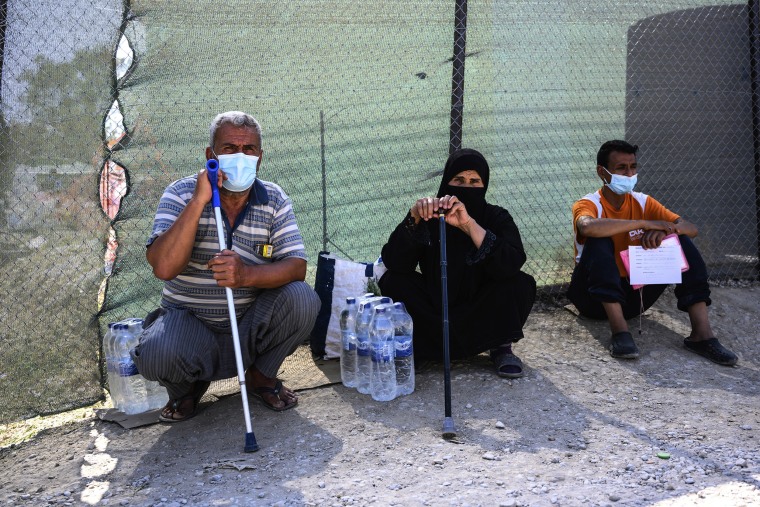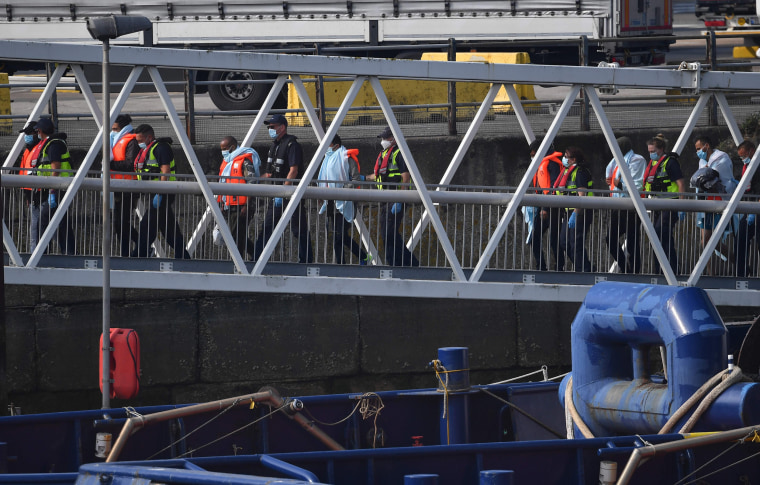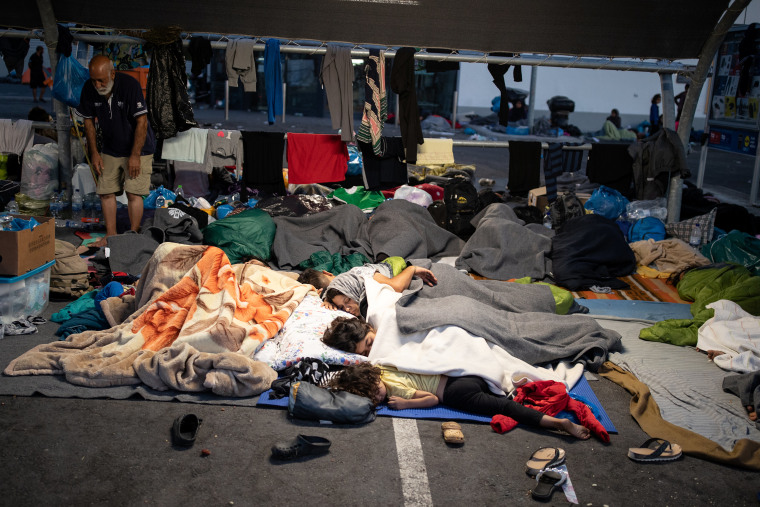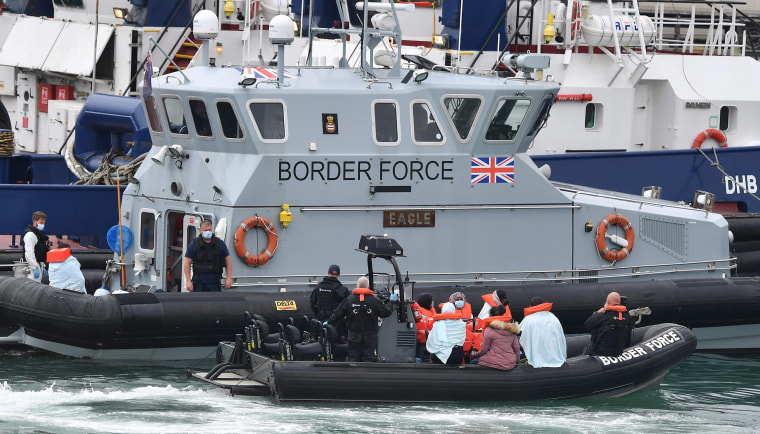LONDON — Clad head to toe in newly bought all-black clothes that held no scent, as instructed by the smugglers who bundled him into the back of a truck, this is how Md Mominul Hamid's life in Britain began.
Hamid risked his life to make the perilous journey from France to Britain, a trip dozens of others make each day.
"I didn't have any choice," the 28-year-old from Bangladesh told NBC News. It's a common refrain from migrants forced by conflict, climate change, finances or family ties to flee in search of a better life.
As the number of people attempting the life-threatening crossings from France to England rose this summer, migrants say they feel scapegoated in a hostile national mood in post-Brexit Britain.
And with parts of Europe having only tentatively emerged from coronavirus lockdowns and cross-border transits still limited, migrants are ditching Britain-bound trucks for precarious travel by sea.

A previous attempt to get to Ireland involving a fake Italian passport procured from a Romanian had already unraveled, Hamid said, costing him thousands of dollars.
"These trafficking gangs are so, so strong and very dangerous, so once you've committed ... you have to follow their instructions," he said, citing stories of those who had been ripped off, beaten or killed and buried in the port of Calais, northern France, where many pass en route to Britain.
Hiding in the back of the pitch-black truckwith another clandestine passenger from India, unable to eat or relieve himself, Hamid was sealed in for 22 hours, fearing those moments would be his last.
"You can't breathe," he said. "I was so scared."
He arrived safely in Britain and has since claimed legal asylum. He still lives with a heavy uncertainty hanging over his future — but he is safe, studying law and often volunteers helping other refugees in the northeast city of Newcastle.
"There's a huge range of reasons why people are seeking sanctuary in the country," he said, adding that immigration had become "more political now rather than a human rights thing."
Download the NBC News app for breaking news and politics
Immigration has long been a hot-button issue in multicultural Britain.
It was a contributing factor to the U.K.'s decision to break away from the European Union in the 2016 Brexit vote. Nationalist campaigners made passionate arguments for "taking back control" of borders and immigration policies — pushing race and identity to the fore, in a country that for centuries colonized vast nations around the world.
In recent weeks, the issue has again garnered headlines, after an uptick in the number of migrants making the short but treacherous crossing from France to Britain. Favorable summer weather and the outbreak of the coronavirus pandemic are thought to have encouraged more to take the chance.
Earlier this month, more than 400 people crossed the English Channel to Britain in a single day, setting a record, according to official data. British Interior Minister Priti Patel has vowed to stem the flow.
Patel has also since appointed a Clandestine Channel Threat Commander, a new role to coordinate with France to tackle illegal attempts to reach Britain.
"The number of illegal small boat crossings is appalling," she said in a public statement. "We are working to make this route unviable and arresting the criminals facilitating these crossings."

Charlie Yaxley of the U.N. Refugee Agency said the numbers were tiny compared to the peak European migration crisis in 2015, when more than a million people crossed the Mediterranean Sea — many drowning.
"This isn't a crisis of numbers, this is a crisis of humanity," he said.
"The sea crossings are just a symptom of the problem and until you address the causes of the problem, that symptom is not going to go away."
He added that most refugees still fled to neighboring countries and only a minority attempted the dangerous sea crossings.
Next week, European Commission President Ursula von der Leyen is set to unveil contentious new asylum policies for the bloc. On Wednesday, she described immigration as a normal fact of life and said the continent should learn to manage it.
Hundreds of would-be asylum seekers have navigated the English Channel this summer, one of the world's busiest shipping routes, many in flimsy rubber dinghies. Some were unaccompanied children, mostly teenage boys from Iran, Iraq and Afghanistan.
"We're getting a concentration at the reception centers, and they are now basically full," said Roger Gough, leader of Kent County Council, where almost all seaborne asylum-seekers come ashore.
There was further local uproar in Kent this week after plans emerged to temporarily house asylum-seekers in a disused army barracks.
Even those who make it to the U.K. have no guarantee of staying.
Britain's Home Office said in a report in May it had returned over 155 people who arrived on small boats, and this week alone returned a further 14 people on flights to France and Germany.

For Ahmad al-Rashid, things went from bad to worse as he fled a siege in his native Aleppo, Syria, in 2012 to neighboring Iraq, only to be later confronted with the Islamic State militant group in Mosul.
"It was fleeing one hell just to end up in another," he said.
Al-Rashid fled to Turkey, then shared a rubber dinghy crammed with women and children to the Greek island of Kos, before heading to Calais and then the U.K. over 55 days — often believing he wouldn't survive.
"All the journey was done through a smuggler from A-Z," he said, at a cost of around $15,000.
"It was the last resort," he added. "You have family members whose life and future is all dependent on you, then you don't have an option."
Al-Rashid, 30, said the main reason he chose the U.K. was because he spoke English and believed the chances of family reunions were "pretty quick." He now lives in England with his wife and two young daughters and has gained a graduate degree in conflict and development.
Covid-19 has forced many countries to turn inwards and suspend humanitarian work, as immigration falls down the list of government priorities.
Facing bleak economic outlooks, countries will also likely see a hardening of social attitudes, humanitarian agencies warn, challenging the post-war consensus that those at risk of persecution deserve shelter.
"The vast majority of people are welcoming, compassionate and understanding," al-Rashid said of his new English life. "The media is playing a negative role now, but overall everyday interactions are positive."
One way or another, he expects many will keep taking their chances and attempt the deadly journeys to Britain in search of sanctuary.
"If you're desperate you'll do anything," he said.
Reuters contributed to this report.

